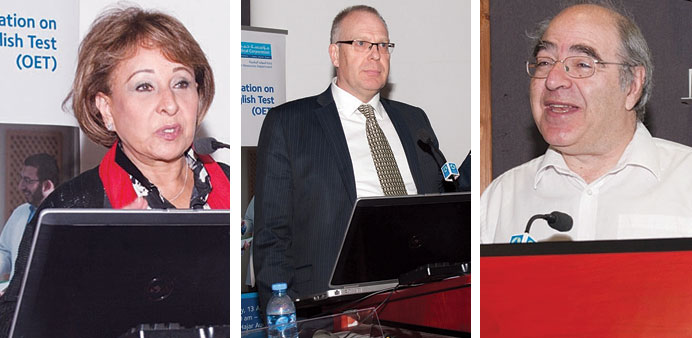|
More than 70 healthcare professionals, including physicians, nurses and other allied health professionals from across Hamad Medical Corporation (HMC), have participated in a seminar conducted by experts from the University of Cambridge, the United Kingdom (UK), highlighting the importance of the Occupational English Test (OET). |
The seminar, also attended by representatives from the Supreme Education Council and British Council, and organised by the Training and Professional Development Section of the Human Resources Department at HMC, provided a comprehensive overview of the OET.
The OET is a standardised test that has been specifically designed to assess the English competency and communication skills of healthcare providers in various healthcare settings around the world.
The test is supported by over 20 regulatory healthcare bodies and councils in Australia, New Zealand and Singapore and is used by many other organisations, including hospitals, universities and colleges as evidence of a candidate’s ability to communicate effectively in demanding healthcare settings.
HMC’s English Department Training and Professional Development manager Dr Mariam Habib said English remains the most common language of communication across all HMC
facilities.
“Introducing the test at the organisation will be a very significant step in ensuring that healthcare professionals at HMC have the desirable language skills that will allow enhanced communication with patients and families and, therefore, reflect in better diagnosis and improved patient outcomes,” she said, adding: “It is definitely time for us to hear about the OET in Qatar as several other countries in the region, including the UAE, Egypt and Saudi Arabia, have adopted the test with great
success.”
The presentation was delivered by the director of Cambridge Assessment Admission Testing Services, Simon Beeston, and associate clinical dean and director of Communication Studies at the School of Clinical Medicine, University of Cambridge, Dr Jonathan Silverman.
Beeston said the University of Cambridge, which owns the test, administered over 4mn English assessment tests last year. “One of the significant things about the OET is that the developers come from the medical profession – physicians, nurses and other allied health professionals who work with experts at Cambridge to create the content of the test and to ensure that the situations are relevant, up-to-date and medically correct,” he stressed.
The OET is divided into four subsets - reading, writing, speaking and listening - and offers examination in 12 modules, including dentistry, dietetics, medicine, nursing, occupational therapy, optometry, pharmacy, physiotherapy, podiatry, radiography, speech pathology and veterinary science.
Dr Silverman, who teaches communication to medical students at the University of Cambridge, said: “When practitioners use language to the best of their abilities, they are able to truly practise high-quality medicine by gaining the trust of their patients and families.”

